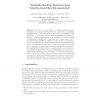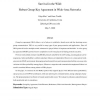86 search results - page 11 / 18 » Impossibility Results for Secret Establishment |
EUROCRYPT
2009
Springer
14 years 8 months ago
2009
Springer
We propose a methodology to construct verifiable random functions from a class of identity based key encapsulation mechanisms (IB-KEM) that we call VRF suitable. Informally, an IB-...
TRUST
2010
Springer
14 years 25 days ago
2010
Springer
All practical software hardening schemes, as well as practical encryption schemes, e.g., AES, were not proven to be secure. One technique to enhance security is robust combiners. A...
ICISC
2008
13 years 9 months ago
2008
Group key agreement (GKA) allows a set of players to establish a shared secret and thus bootstrap secure group communication. GKA is very useful in many types of peer group scenar...
TIT
2011
13 years 2 months ago
2011
—In the paradigm of network coding, the nodes in a network are allowed to encode the information received from the input links. With network coding, the full capacity of the netw...
ALT
2006
Springer
14 years 4 months ago
2006
Springer
We consider the problem of online learning in settings in which we want to compete not simply with the rewards of the best expert or stock, but with the best trade-off between rew...


